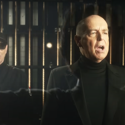
What’s more scandalous: That a homosexual member of Al Qaeda was sought out as an informant for the CIA? Or that the CIA actively sought out a homosexual terrorist because they could use his sexuality as leverage to force him to cooperate?
One of the reasons critics of Don’t Ask Don’t Tell find the policy so deplorable is that a gay soldier’s sexuality can be used as leverage against them. Sometimes it happens domestically; fears remain that captured gay soldiers could find themselves in similar tortuous situations. Supporters of DADT, meanwhile, also cite these reasons as why the policy is needed — because gay soldiers might be trusted with sensitive information, keeping their sexuality a secret is imperative should it ever be used against them. (Moreover, supporters of the outright ban of any gay servicemembers claim homo soldiers are weaker, and thus cannot be trusted at all with such sensitive information, blah blah.)
All of which brings us to The Gay Terrorist, as the Observer dubs Ahmad Hikmat Shakir, or “Shakir el Iraqi,” an Iraqi. To the CIA, Shakir was an Al Qaeda operative whom it believed it could control under the threat of leaking his sexuality to his fellow neer-do-wells, which would almost assuredly lead to his death.
Described as “tall as a mushroom, fat and gay,” Shakir entered the Pentagon’s radar as a 25-year-old VIP greeter for Malaysian Airlines. They knew he was involved in terrorist training camps, and in 2000, in Kuala Lumpur, he escorted Yemeni-born terrorist Khalid al-Mihdhar to what turned out to be a summit for planning the 9/11 attack. CIA agents never informed the FBI about their findings, the Observer says, because of their high school clique mentality, and fears the FBI would screw up their covert ops. That the FBI could have intervened with this intelligence is up for debate; Mihdhar, of course, was among those on board American Airlines Flight 77, which crashed into the Pentagon. The CIA told the FBI about Shakir and Mihdhar in August 2001. By then, their trails had been lost.
How about we take this to the next level?
Our newsletter is like a refreshing cocktail (or mocktail) of LGBTQ+ entertainment and pop culture, served up with a side of eye-candy.
As it stands, Shakir hasn’t been seen since 2001, and nobody has a photo of him. It leaves open the possibility that he is alive and well, living in the Middle East, helping to plan, or at least aid in, new terrorist operations.
The 9/11 Commission never explained why the CIA “mishandled” (depending on who you ask) the intelligence. It also never explained how widespread the CIA’s tactic of using terrorists’ sexuality to coerce them into spying for the U.S. is. In the end, attempts to flip Shakir didn’t work, though that doesn’t mean zeroing in a Al Qaeda members’ homosexuality, as a means to force cooperation, is a lost cause. But is it a just one?
You’ll find many who say, in the war on terrorism, or whatever you want to call it, that anything goes. Okay, maybe waterboarding is too much, but is threatening to expose one’s sexuality crossing some ethical line? And, of course: Are there even ethical lines in terrorism?
Knowing Shakir’s sexuality was a liability for him inside Al Qaeda, it is just to latch on to his sexuality as a weakness in order to force him to turn?
(NB: We can’t shake this thought: What if the CIA did manage to turn Shakir, and with his help were able to foil Al Qaeda’s 9/11 plot? Then Shakir would be what, the gay terrorist hero?)



















Cam
Hmm, well he is supporting an organization, that works with the Taliban, who, when they were in power murdered gays just for being gay. So that pretty much makes him similar to closeted politicians who vote for or support anti-gay legislation or organizations.
Jon B
Totally fine with this. In fact, I’m not just fine with it… I support it. Fuck terrorists.
mike
Absolutely … first, the guy is a member of a religion that executes gays for being gay.
Second, he’s going to help kill a ton of innocent people … now, if he were planning on bombing a Republican convention, I might feel differently …
adrianofnyc
This has been a staple of “spy-craft” since it began, hasn’t it? I remember taking a class on “Spies and Lies” in college (long ago), and people were always threatening to out the ambassador’s assistant and stuff like that.
Delivering a source into the hands of killers, though, does raise some difficulties. That said, I think it is a distinguishable set of circumstances from torture.
Rikard
Sexual deviance of any sort has never been an obsticle to power. In fact it fosters a kind of secrecy pact mentality. A willingness to seduce, then shame teenage boys, then manipulate them into suicide bombers as a form of redemption seems plausible.
Mike in Asheville, nee "in Brooklyn"
Just because the CIA says something is so, does not necessarily make it so. Remember all those weapons of mass destruction, the CIA told us they knew exactly where each one was. And, wasn’t it the CIA that determined that Iraq/Sadaam were, along with Al Qaeda, was responsible for 9/11? Oh, and the CIA determined that the aluminum construction tubes were actually bomb parts?
Sam
As hard as it is for me to imagine why anyone would join Al Qaeda, it’s even harder to wrap my mind around why a gay person would join Al Qaeda. “Yay! Let’s establish a worldwide Caliphate where everyone lives under Sharia law! And on that glorious day, I’ll be stoned to death!”
Brown Gay Al
Gay or straight hes a terrorist. thats the only way to look at him.
hephaestion
A lot of the terrorists who hijacked planes on 9/11 set off my gaydar when I saw their photos. I assumed their lives must be so horrible, being gay in Saudi Arabia, that killing themselves didn’t seem much worse than worrying about being beheaded by the Saudi government.
Jake the libertarian
Simple question with a simple answer… Yes… Yes the CIA should do this. I hope they do it. I hope they continue to do it. I hope it is successful. Fuck those terrorist bastards, no matter who they like to screw.
Keldawgs
I’m one of those rare creatures who believes the PNAC committed 9/11 and not what was presented as the enemy, but you lemmings have been sung too so I’m in the minority.
Keldawgs
My answer is NO!
Yet Another
Of course its wrong. Period. There is nothing right about it.
But I don’t think we care. And if WE dont, I know most straight people wont either. There’s a difference between being right and being ok. And there are a lot of things we’re ok with for the greater good.
Steve
CIA actively seeks out any enemy (aka, terrorist) against whom they can find any leverage at all to get them to cooperate. That’s part of what they do. It shouldn’t surprise anyone. Human intelligence is a nasty, dirty business.
Sexuality is leverage. Extramarital affairs are leverage. Swiss bank accounts are leverage. Willingness to accept cash is leverage. Any sort of skeleton in any closet is leverage.
And of course, after the first little bit of cooperation, the fact of the previous cooperation is leverage toward future cooperation.
The hard part is figuring out if the cooperating person is being honest with you. But, that difficulty hasn’t changed, either.
tjr101
Hell yes! He’s a terrorist. I already support the outing of homophobic lawmakers anyway.
benlayvey
So what, are these gay terrorists promised 7 gay virgins in paradise? Good luck finding a gay virgin—they are extinct, a laughable notion, nes pa?
Jadis
Well, the CIA has already committed every crime in the book, what’s one more?
ousslander
I think him being a terrorist trumps the gay card.
TVS
Comparing this guy to a closeted anti-gay politician is not really fair. The closeted politician has a clear choice – he can come out, knowing that there is a community ready to support him, knowing that he will not be killed for coming out. This is not the case with our gay terrorist. Further, we don’t even know why he decided to join this terrorist group. Did he willingly join or not? Did he have a clear-cut choice as whether to join the terrorist group or not? We know nothing about the guy, so I’m not going to pass judgment in him.
One of the things that being gay has helped me to learn is compassion for all sentient beings, not just those whom are not against my survival.
“All beings tremble before danger, all fear death.”
– The Buddha
Polar Bear
The CIA is using Psychological Warfare on gays, even in America. The CIA and FBI are using blackmail on gays by threatening to expose them, even Americans.
The solution is for all gays to come out of the closet so the CIA and FBI can not use blackmail to control them. When everybody knows a person is gay the CIA and FBI can not use ( do what we want or we will expose you for being gay )black mail on them.